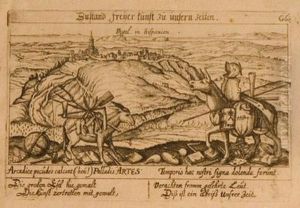Daniel Meisner Paintings
Daniel Meisner was a German engraver and writer, born in 1585 in Komotau, which is present-day Chomutov in the Czech Republic. He is best known for his work 'Thesaurus Philopoliticus' or 'Politica Emblemata', a collection of emblematic copper engravings with moralizing texts, which he started in 1623 and was later continued by Eberhard Kieser after Meisner's death. The work contains numerous city views and plans, accompanied by allegorical emblems and short epigrams in Latin, with later editions including German couplets.
Meisner's 'Thesaurus Philopoliticus' was a significant contribution to the genre of emblem books, which were popular during the 16th and 17th centuries. Emblem books combined illustrations with mottoes and texts to convey moral, social or political messages. The copper engravings in Meisner's collection are notable for their detailed and accurate representation of the cities at the time, making them valuable resources for historical urban studies.
Although Meisner is primarily remembered for his emblem book, his life beyond his profession and his contributions to the 'Thesaurus' is not extensively documented. He spent most of his career in Frankfurt am Main, and it is there that he collaborated with Kieser, a publisher and engraver who took over the project after Meisner's death in 1625. The 'Thesaurus Philopoliticus' was eventually completed in 1631-1632, with a total of about 800 engravings representing various cities in Europe, Asia, Africa, and the Americas.
Daniel Meisner's work remains an important historical document, reflecting the intersection of art, culture and the socio-political climate of the early 17th century. Although little is known about his personal life and training, his legacy endures through the detailed engravings that give us a glimpse into the urban landscapes and the emblematic imagination of his time.
